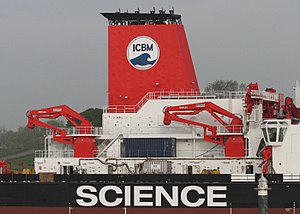Institute for Chemistry and Biology of the Sea
| Institute for Chemistry and Biology of the Sea of the Carl von Ossietzky University Oldenburg - ICBM - |
|
|---|---|
 Chimney of the new deep sea research ship SONNE with ICBM logo |
|
| Carrier: | State of Lower Saxony (as part of the University of Oldenburg ) |
| Facility location: | Oldenburg |
| Branch offices: | Wilhelmshaven, Spiekeroog |
| Type of research: | Interdisciplinary basic research , modeling, applied research v. a. in the field of marine technology with a focus on sensors |
| Management: | Thorsten Dittmar (Director) |
| Employee: | about 150 |
| Homepage: | www.icbm.de |
The Institute for Chemistry and Biology of the Sea ( ICBM ) at the Carl von Ossietzky University in Oldenburg is the only marine science institute in Lower Saxony .

The ICBM is located on the Wechloy campus in Oldenburg with external locations in Wilhelmshaven ( location ) and on Spiekeroog (based on the Wittbülten National Park Center on the site of the Hermann Lietz School ). It operates u. a. the Spiekeroog hydrographic measuring station as well as several research vessels and is the home institute of the research vessel Sonne, which went into service in November 2014 .
Mission statement & research
The ICBM is active in both basic research and in the applied field of marine and environmental sciences . The diverse interrelationships of marine environmental systems should be understood through interdisciplinary research.
Central research areas are marine material cycles and energy flows as well as the functional role of the diversity of life in the sea, especially in coastal waters around the world, but also in the oceans.
The modeling characterization of the various environmental systems at the ICBM is supported by high-resolution analytics and our own developments in the field of marine sensors.
The ICBM wants to promote interdisciplinary research in order to understand the diverse interrelationships. The institute is divided into three departments with a total of 18 working groups:
- Department of Geochemistry and Analytics
- Department of Biology and Ecology
- Physics and Modeling Department
University education
The ICBM's study programs are integrated into the research activities and consist of an environmental bachelor's degree with marine, environmental and landscape-ecological components as well as four master’s degrees. In addition to the master's degree in marine environmental sciences, these are the English-language course in microbiology, environmental modeling and marine sensor technology. The Jade University in cooperation with the ICBM offers a basic bachelor's degree in the field of marine technology . The ICBM is an ERASMUS exchange partner .
history
The Lower Saxony Minister for Science and Art approved the establishment of the ICBM in July 1987 as a cooperation between the departments of mathematics, biology, physics and chemistry. In 1991 the ICBM was approved as the central institution of the University of Oldenburg. The association Center for Shallow Sea , Coastal and Marine Environmental Research, founded in Wilhelmshaven in 1990 and institutionally financed from state funds . V. - Research Center Terramare was incorporated into the ICBM in 2008 with its research center inaugurated in 1994.
Former directors of the ICBM are Wolfgang E. Krumbein , Ulrich Kattmann , Hans Joachim Schellnhuber , Bruno Eckhardt , Wolfgang Ebenhöh , Heribert Cypionka , Meinhard Simon , Hans-Jürgen Brumsack , Ulrike Feudel , Jürgen Rullkötter , Helmut Hillebrand , Bernd Blasius and Oliver Zielinski . The institute is currently headed by Thorsten Dittmar .
Cooperations and memberships
The ICBM cooperates with the Max Planck Institute for Marine Microbiology and the MARUM , both in Bremen, the Alfred Wegener Institute in Bremerhaven as well as Senckenberg am Meer and the Jade University , both in Wilhelmshaven . The ICBM is a member of the German Marine Research Consortium and the Northwest Marine Research Association. V.
Web links
literature
- Jürgen Rullkötter : From cuckoo egg to lighthouse: marine research at the University of Oldenburg . Isensee, Oldenburg 2016, ISBN 978-3-7308-1274-7 .
Individual evidence
- ↑ a b history of the institute on icbm.de, accessed on August 21, 2019.
- ^ Institute for Chemistry and Biology of the Sea, University of Oldenburg , German Marine Research Consortium , accessed on May 15, 2018.
- ↑ Research Center Wittbülten , www.nationalparkhaus-wittbuelten.de, accessed on May 15, 2018.
- ↑ Spiekeroog measuring station on icbm.de, accessed on August 15, 2013.
- ↑ Research Boats & Ships at icbm.de, accessed on August 15, 2013.
- ↑ Deep-sea research ship "Sonne" on icbm.de, accessed on August 15, 2013.
- ↑ ICBM working groups , accessed on August 15, 2013.
- ↑ Degree programs on icbm.de, accessed on March 19, 2014.
- ↑ Deutsche Universitätszeitung , Volume 43, 1987, Issues 13-24, page 31.
- ↑ Chronology of the City of Wilhelmshaven , wilhelmshaven.de, accessed on May 15, 2018.
- ^ Jadestadt becomes a university town: Projects of the University of Oldenburg for Wilhelmshaven - cooperation . In: Nordwest-Zeitung , January 5, 2008.
- ↑ Project partner on icbm.de, accessed on August 15, 2013.


